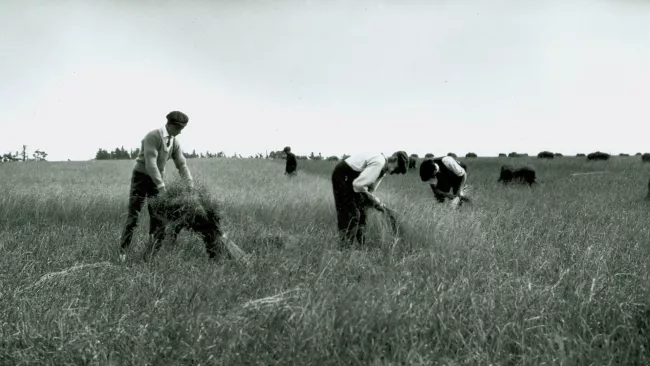From the Archives
The City of Vaughan’s archives house more than 600 collections dating from the early 1700s to the present day. Within these files are the stories of how Vaughan evolved from the traditional territories of the First Peoples of Turtle Island to the bustling city it has become.
Let’s look back at our history and share the stories of the people, places and moments that helped shape the city we know today. This month’s feature is on the Langstaff Industrial Farm.
The Langstaff Industrial Farm, located near present-day Yonge Street and Highway 7, played a significant role in addressing social challenges in the early 20th century. Established in 1912, it aimed to ease overcrowding at Toronto’s Old Don Jail. While officially operating as a minimum-security prison for first-time offenders, it also housed people experiencing homelessness, substance use challenges and unemployment.
Following the First World War, economic hardship and unemployment deeply affected communities. By the 1920s, thousands of service members returned home to a lack of job opportunities. Public employment bureaus were overwhelmed, leaving many with no means to support themselves or their families. In 1925, the Langstaff Industrial Farm sheltered 16,500 individuals with no home, including many unemployed veterans.
The farm’s 156-hectare (386-acre) property featured dormitories, a kitchen and dining room, barns and silos, sheds and farm out-buildings, a pump house and water tower. Inmates contributed to farm operations, producing much of the food consumed on-site. The farm also supported a women’s facility in Concord, with men from Langstaff assisting in the fields.
The farm later served additional purposes. It housed seniors who were unable to work due to age or poor health and briefly operated as a hospital during the Second World War. By 1939, the Langstaff and Concord Farms were closed, and inmates were transferred to other facilities. The land was returned to the City of Toronto in 1958. Today, the area is home to highways, rail lines and shopping centres.
The Langstaff Industrial Farm stands as a reflection of how the neighbourhood responded to the social and economic challenges of its time, shaping the community we know today.
VIEW VAUGHAN'S ARCHIVES ONLINE!
Looking for more information about the history of Vaughan? The City's Archival Collection is on digital display for all to explore! The below galleries are available in the City's online gallery on Flickr:
- From Township to City: The Evolution of Vaughan
- Historical Families of Vaughan
- Historical Photography
- Past Mayors of Vaughan
- Prohibition in Vaughan
- Recollections of Rural Vaughan
- The Great Depression in Vaughan
- The Mary Wood Collection
- The Way We Were: Representations of Vaughan's Past
- Vaughan’s Forgotten Heroes
- Vaughan Lodge Fonds
- Vaughan Working Environments
- Vaughan Through the Ages: Medicine, Music and Sports and Recreation
- And more!
A personal Flickr account is not required to access the City's online gallery, which contains only a small selection of the full archives collection. If you are looking for a particular image, original file, primary source record or more, please visit the Archival Database or contact the City by calling 905-832-2281 or emailing archives@vaughan.ca.
By managing and preserving both City and community records, the City’s Enterprise Information Management Services team ensures that Vaughan's rich and varied history will continue to be available for future generations. Learn more at vaughan.ca/archives.
For the latest updates, subscribe to Vaughan News and follow the official corporate channels on X, Facebook, Instagram and LinkedIn.





